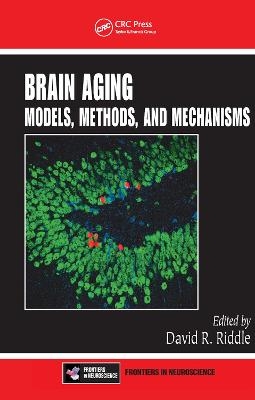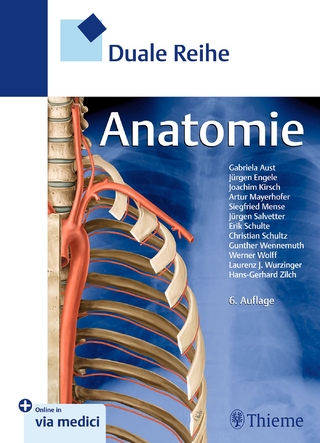
Brain Aging
Models, Methods, and Mechanisms
Seiten
2019
CRC Press (Verlag)
978-0-367-45310-7 (ISBN)
CRC Press (Verlag)
978-0-367-45310-7 (ISBN)
Bringing together critical studies of brain aging in animal models and insights from human brain imaging, this text focuses on fundamental age-related changes in the brain. Offering significant depth and breadth of coverage, it provides an overview of structural and functional changes at the molecular, systems, and cognitive levels. Written by p
Recognition that aging is not the accumulation of disease, but rather comprises fundamental biological processes that are amenable to experimental study, is the basis for the recent growth of experimental biogerontology. As increasingly sophisticated studies provide greater understanding of what occurs in the aging brain and how these changes occur, new possibilities emerge for limiting the effects of aging on neural function. A single source reference is necessary to keep abreast of the recent advances and future directions of gerontology research.
Brain Aging: Models, Methods, and Mechanisms offers a selective overview of the research in this rapidly expanding field. A valuable resource for new and established investigators of the aging brain, this volume reviews critical studies of brain aging in new animal models, as well as advances in brain imaging techniques that permit investigations in aging humans with increasingly higher resolution. Detailed discussions link the information from human and animal studies to illustrate a comprehensive picture of the mechanism of aging.
Emphasizing normal brain aging rather than pathological degeneration, the text provides an understanding of fundamental age-related changes in the nervous system and hypothesis-driven research into their basis. The book includes critical analyses of the distinct methodological challenges inherent in investigating the aging nervous system. Contributions from distinguished leaders and pioneers in their respective fields address data and mechanisms, as well as models and methods that are key to the study of aging. Each chapter is extensively referenced and highlights experimental concerns that are magnified or unique to the aging brain.
Outlining relevant methods and techniques, this book provides scientists, researchers, and clinicians with a broad understanding of the important progress and implications for the future of this significant field.
Recognition that aging is not the accumulation of disease, but rather comprises fundamental biological processes that are amenable to experimental study, is the basis for the recent growth of experimental biogerontology. As increasingly sophisticated studies provide greater understanding of what occurs in the aging brain and how these changes occur, new possibilities emerge for limiting the effects of aging on neural function. A single source reference is necessary to keep abreast of the recent advances and future directions of gerontology research.
Brain Aging: Models, Methods, and Mechanisms offers a selective overview of the research in this rapidly expanding field. A valuable resource for new and established investigators of the aging brain, this volume reviews critical studies of brain aging in new animal models, as well as advances in brain imaging techniques that permit investigations in aging humans with increasingly higher resolution. Detailed discussions link the information from human and animal studies to illustrate a comprehensive picture of the mechanism of aging.
Emphasizing normal brain aging rather than pathological degeneration, the text provides an understanding of fundamental age-related changes in the nervous system and hypothesis-driven research into their basis. The book includes critical analyses of the distinct methodological challenges inherent in investigating the aging nervous system. Contributions from distinguished leaders and pioneers in their respective fields address data and mechanisms, as well as models and methods that are key to the study of aging. Each chapter is extensively referenced and highlights experimental concerns that are magnified or unique to the aging brain.
Outlining relevant methods and techniques, this book provides scientists, researchers, and clinicians with a broad understanding of the important progress and implications for the future of this significant field.
Riddle, David R.
Assessing Cognitive Aging, Quantifying Aging-Related Changes in the Brain, Assessing Functional Changes in the Aging Nervous System, Mechanisms Contributing to Brain Aging, Index
| Erscheinungsdatum | 03.12.2019 |
|---|---|
| Verlagsort | London |
| Sprache | englisch |
| Maße | 156 x 234 mm |
| Gewicht | 453 g |
| Themenwelt | Medizin / Pharmazie ► Allgemeines / Lexika |
| Medizin / Pharmazie ► Medizinische Fachgebiete ► Geriatrie | |
| Studium ► 1. Studienabschnitt (Vorklinik) ► Anatomie / Neuroanatomie | |
| Naturwissenschaften ► Biologie ► Humanbiologie | |
| Naturwissenschaften ► Biologie ► Zoologie | |
| ISBN-10 | 0-367-45310-X / 036745310X |
| ISBN-13 | 978-0-367-45310-7 / 9780367453107 |
| Zustand | Neuware |
| Informationen gemäß Produktsicherheitsverordnung (GPSR) | |
| Haben Sie eine Frage zum Produkt? |
Mehr entdecken
aus dem Bereich
aus dem Bereich
Struktur und Funktion
Buch | Softcover (2021)
Urban & Fischer in Elsevier (Verlag)
CHF 61,60
Buch | Hardcover (2022)
Urban & Fischer in Elsevier (Verlag)
CHF 307,95


